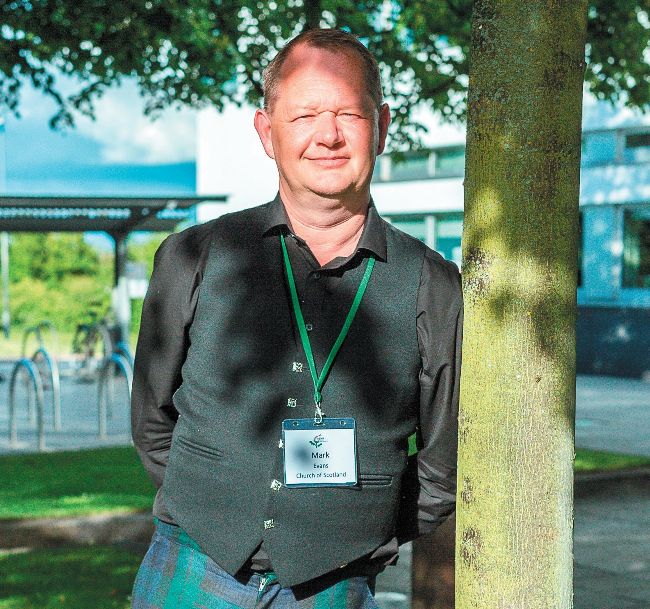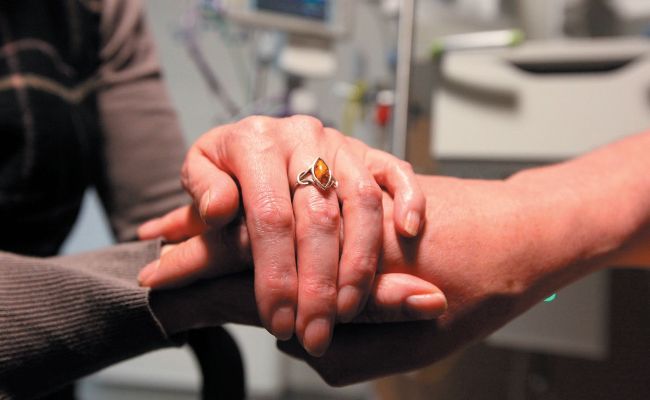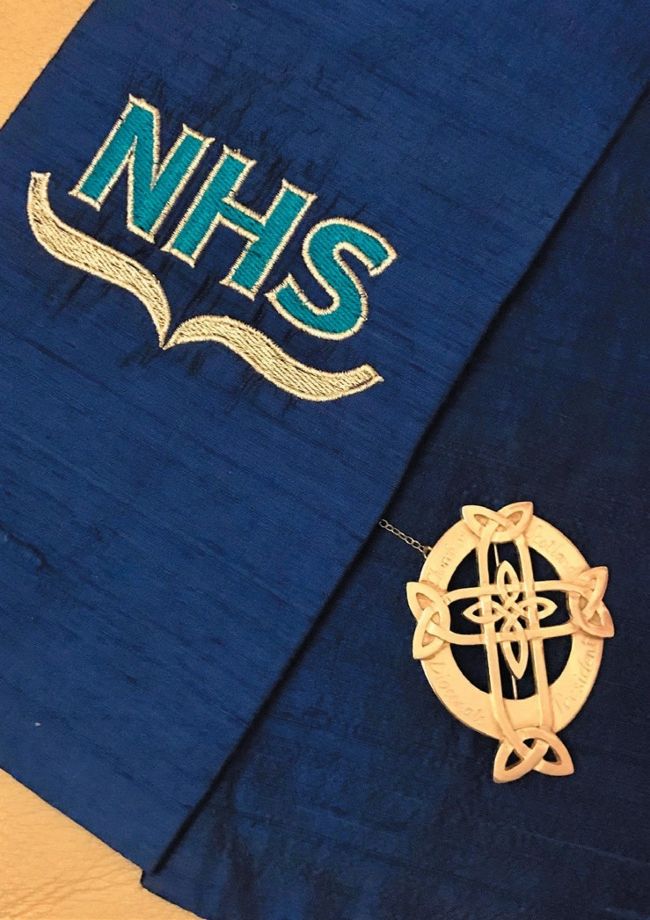’A real honour and a real privilege’
Jackie Macadam learns about the work of the newly elected President of the Diaconate Council, Mark Evans DCS.
“MY call was always to be a Deacon. I never saw myself as being the person upfront, leading the way – it wasn’t a role I was comfortable with. I saw myself very much as walking with the people of God rather than leading them.”
Mark Evans DCS is the newly elected President of the Diaconate Council and works as Head of Spiritual Care with NHS Fife. Born in north Edinburgh into a large extended family, Mark always felt drawn to the church.
“North Edinburgh in the 1970s and the early 80s was notorious as a centre for drugs and gangs. However, my childhood was really happy. I grew up in a large extended family, which was based around my gran and granddad who were a huge influence in my life.
“My grandparents had a strong faith and were members of the church and brought their family up within the Church. Our home church was the Old Kirk, West Pilton – or the White Church as everyone called it. The teaching of PaPa Reid (Iain Reid who took over from George McLeod as Leader of the Iona Community) created in my wider family a great respect for the Kirk. It had a huge eff ect on my family – and whilst I was the only one who attended church regularly – the Old Kirk remained central in my family. “
Unlike many children, Mark rather enjoyed going to the church, and he wasn’t one for Sunday School either. “The Old Kirk was my spiritual home and the ministers and elders had a big influence on my life and my future great ministry. I started going to church when I was eight. I went by myself and wasn’t a fan of the Sunday School – I much preferred sitting watching and listening to the service. Jess Wilson, the Sunday School superintendent and Eric Grant the Session Clerk, treated this silly wee laddie who turned up on a Sunday morning with respect. I felt accepted and loved and included. The first minister I remember was Colin Anderson – and the importance he gave to the preparation and conduct of worship. Then there was Tom Gordon and Maureen Hutchison who taught me about the unconditional love of Christ, who accepted me for who and what I was. I was a child of God made in the image if the Creator – and I was loved. Ian and Elsie Moir started the weekly Worship Workshop – the predecessor of Messy Church! They taught me that the church was more than the building but the people and I was introduced to Summer Mission by them too.” His school years were a real struggle for Mark, with undiagnosed dyslexia. He found school difficult and frustrating, excelling only in music.
But he had a deep and heartfelt call to the ministry – and that meant going to college and passing exams. Teachers told him not to waste his time and to apply for work at some of the local factories like many of his peers. His parents were not happy and his mum pushed the school to allow him to try for the two Highers he needed.
“Teachers Kate Ballanytne and George Meldrum were impressed by my mum’s determination that I should get qualifications, and the next thing I knew I was sitting Higher English and Higher Geography – George promised my mum that no matter what it took, he would make sure I got my two Highers. I was the only 6th Year to have a spelling book and a reading book. After school I was accepted as a student at St Colm’s College – the Church of Scotland College in Edinburgh. It was at college I was diagnosed with severe dyslexia and that helped me make sense of my experiences at school.
“Following St Colm’s and after a period of work with, what was then, (the Board of) Social Responsibility, I applied to do nursing and was accepted as a student nurse with the North Lothian College of Nursing and Midwifery. Many years later I went to Napier and got a degree in nursing specialising in palliative care and adolescent mental health. Next stop was Glasgow University – where I was the first person to achieve a masters in Healthcare Chaplaincy and Spiritual Care……. and now… now I’m an honorary lecturer at St Andrews University medical school – not bad for a boy from Pilton with dyslexia!” But his calling was still there, urging him towards service. “I always wanted to serve God and enter into full-time work with the Church. During high school I thought the only option was to become a Minister of Word and Sacrament. Deaconesses had played a huge role in nurturing my faith and supporting my calling – growing up in North Edinburgh there were Deaconesses such as Maureen Hutchinson, Morag Crawford and Lynda Wright who were involved in cutting edge outreach and pioneering ministry. However, I had assumed that the Diaconate was only for women. It was only when I went to St Colm’s that I realised I could be a Deacon – and then everything fell into place. “In my second year at St Colm’s, I applied to become a candidate for the Diaconate.
“The office of Deacon had been open to men since 1979, but no man had actually ever applied. I was called to a meeting to discuss my application. I was crushed when over coff ee and scones I was told I did not have the gifts or skills to be a Deacon. In that split second I felt I’d lost everything. Then I became aware that the topic of conversation had changed – and that it was being suggested that I should apply to be a ‘real’ minister, because the Church needed young men like me with my background and experience.
“I went back to St Colm’s and spent a number of days considering what to do next. “As I sat in the college chapel looking at the stained glass window of Christ with the words: They calleth his own by name, and they follow him for they know his voice. I was more certain than ever that God was calling me to be a Deacon and I had to follow his call. So I reapplied and my application was accepted. In spring 1997 I was accepted as a candidate for the Diaconate.
“On leaving St Colm’s I started working with the Board of Social Responsibility (now CrossReach) as a residential care worker in the old ‘People’s Palace’ a hostel for homeless men. I worked with young homeless men many of whom had turned to alcohol and drug use to the numb the pain of living. … and many who had turned to crime or the sex industry to pay for their habits. They had been shunned and pushed away by society. In the middle of historic Edinburgh, amongst the tourists and the expensive hotels and fancy restaurants there was a whole other society – forgotten and ignored. As a Deacon I found myself in a ministry which was practical and pastoral, displaying the Gospel of Christ through Service and in Word.

Mark Evans DCS. Photo by Craig Steedman Photography
As a Deacon I found myself in a ministry which was practical and pastoral, displaying the Gospel of Christ through service and in word.

Care at NHS Fife. Photo by Craig Steedman Photography
“After a few years, I went into parish work where my main area of ministry was in pastoral care and children’s and youth work before going into healthcare chaplaincy.” Mark has been working as a Deacon for 30 years and reckons he’s seen just about everything. It’s a mission he has never once doubted.
“Over the past 30 years, it has been a privilege to share with people the highs and lows of human life. Standing at the bedside in a hospital, laughing with young people on school camp or standing at the graveside of a teenage boy – in all these situations, on all these occasions I have sought to display the accepting and healing love of Christ. It is a real honour and a privilege for strangers and church members to invite you in to share with them their pain, their hurt and their tears. Perhaps the area of ministry which has touched me most has been my work with those parents who have experienced the pain of pregnancy loss or the death of a child. “It’s an area which all I can off er is my time and help create a space. There are no words; there are no medications or anaesthetic that can take away the pain of such grief. All I can off er is my presence, to try and ‘hold’ the space allowing those whose heart was breaking to express their pains, and hurt their anger and their anguish. Often anger and disbelief are prominent emotions which need to be acknowledged.
“Over the years these parents have taught me far more about pastoral care and the love of God than any course or book. I have learned that I do not need wise words of comfort, I don’t need to defend God, I do not need to try and fix things and make it better – I simply have to be present. “Many I work with have no Church connection and would say that they are not religious. We hear all the time about declining numbers in church attendance, that we live in a post Christian society – that the church and belief in God has become irrelevant. That is not my experience. There is a huge spiritual awakening in society, people are seeking answers, seeking peace and healing in a world which seems chaotic. A world that can be confusing and where life can be bitter sweet. When I ask people about the format and content of their child’s funeral the first response is usually: ‘We don’t want it all churchy’, but when you explore what they do want, they want to know that God loves their child and them, that their child is safe with God – free from harm and pain and that one day they will meet again. Such is the basis of the Gospel which we are called to proclaim. That’s an amazing trust to be given.”
Mark feels that the Diaconate can off er that very special gift – being present with the people they serve.
“The modern world can be bewildering and confusing at times – and it’s a world of contrasts and extremes. The phones in our pockets have more computing power than the computers used to send the first man to the moon. Medical science can now off er treatments and cures which only a few years ago would be unthinkable. Household items such as TVs and cars are now commonplace – and as a society, we are caught up with reaching material goals, developing an online persona – often putting I, ‘me and mine’ first.
“It’s also a world where trust and respect for the establishment has either become fragile or lost altogether. The search for fulfilment has been at a cost, a cost to the planet and those who are unable to speak up for themselves.
“Amidst the conflicting voices, the Diaconate is called to speak truth to power. “Deacons by their very calling stand beside people and communities, holding the space and proclaiming the simple truth; you are a child of God made in his image and you are beautiful and unique. They hold the light of Christ in the darkness of people’s fears, affirming that tears and laughter, pain and joy are all part of human life. Building bridges between the sacred and the secular; the seen and the unseen; the known and the unknown.”
Mark was elected President of the Diaconate in June this year. “The Diaconate has a crucial ministry within the Church and in society,” he says. “The Diaconate challenges the church and the establishment through a ministry which is prophetic and apostolic. As servants to the servant of God we are called to speak out for those who have no voice within the structures of the church. To ask the question, ‘whose needs are being met here?’ Are new projects, schemes or plans for the benefit of the Church or for the glory of God?
“Being freed from the responsibility of maintaining structures and processes allows Deacons the freedom to walk with people, to share their hopes and dreams and to help them find hope in the midst of suff ering and uncertainty.
“To be called to the Diaconate, is not to be called to a specific job or role. Rather the call to the Diaconate is a call to a way of life. When the Diaconate was established it was the Order of Deaconesses – a ministry where women dedicated their whole life in the service (not of the Church) but to the work of the Gospel.
“As the Church of Scotland wrestles with strategic plans and seeks to find a way forward; the Diaconate off ers to the Church a ministry which is radical and collaborative. A ministry which works outside the normal structures and processes, a ministry which stands with people and says: you are loved and you are redeemed.
“Sadly, due to a number of factors, we have seen recruitment to the diaconate reduce over the past few years. Currently there are only about 34 active Deacons within the Church of Scotland. Of them, 14 do not work for the church but in other sectors such as education, health, prisons and social work.
“Over my three years in office, I hope to raise the profile of the Diaconate within the Church. I want to see Deacons recognised as vital roles within Presbytery Plans. “I would also like to see the Church review and consider the training, and employment of Deacons as part of the new structures so than when Candidates are undergoing the discernment process the Diaconate is seen as just as appealing and worthy as the Ministry of Word and Sacrament.”

Mark Evans DCS. Photo by Stephen Steiner